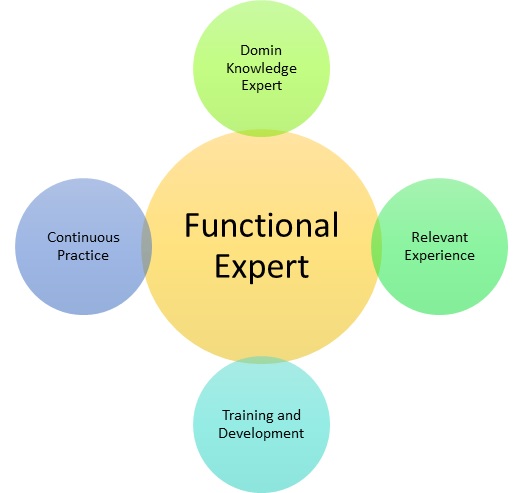- Business Concepts ›
- Human Resources (HR) ›
- Functional Expert
Functional Expert
Definition, Importance & Example
This article covers meaning & overview of Functional Expert from HRM perspective.
What is meant by Functional Expert?
Functional expert is a person is a specialist or expert in a particular domain of the subject. A functional expert plays the role of a differentiator is an organizer, he specializes in one subject and is a master in that, so any matter related to his subject, he comes to the rescue in such situation. A role of functional expert is very much mandatory in the modern organizations.
Mostly as it is identified in the HR domain, the various subjects can be talent acquisition, career development, compensation and reward management, payroll management, performance appraisal and many more. Functional experts or say the specialists are actually very much needed in all the organizations now a days. As slowly the organizations are getting evolved into more employee friendly structures and also more flat structures, functional experts help in handling the uncertainties that come with the external environment.

Functional Expert Qualities
Some qualities and responsibilities of a functional expert are:
1. Domain Knowledge Expert
2. Relevant Experience
3. Training and Development
4. Continuous Practice
Importance of Functional Expert
Functional experts’ role is unique to the modern day organizations. They are a master in their subjects and can come to the rescue in times of crisis. In present day organizations, unlike the traditional ones, HR has become one of the most important departments of the organization. Employee engagement, employee motivation and many other such employee welfare related terms have come up. In such scenarios the environment with which the organizations works also pose various risks and uncertainties to the organization. A functional experts plays the role of a differentiator here, he helps teams with his specialist skills and helps organizations cope up with the uncertainties. There are many functional experts in an organization, they can take up the works separately work upon them, come up with the solutions and help organizations with the problems they are currently facing. But again here the differentiators need to be grounded and need to collaborate with the team, they can also play the role of integrators in an organization, but if they are not willing to be that the other team members should act as integrators and help with the collaboration and team management. An organization needs both the differentiators and integrators for its proper functioning.
Advantages & Disadvantages of Functional Expert
Some advantages of a functional expert are:
1. Risk avoidance.
2. Better employee engagement.
3. Collaboration.
4. Team work.
Certain disadvantages are:
1. Fights among the differentiators.
2. Ego clashes.
Example of Functional Expert
An organization is vulnerable to many risks and uncertainties. In such a situation a differentiators acts as a life savior. Suppose an organization is facing a problem in its compensation and reward management system. The functional expert who is a specialist in this subject, can analyze the situation and help the organization to tackle with the problem. Suppose there is a problem of setting the salaries of the employees, the functional expert would first do a job evaluation, using point method of evaluation and analyze that the organization is paying with the market, above or below that. Pay grades and pay scales can be diagrammed on the basis of that. So, this is how a problem can be solved with the presence of a specialist rather than a generalist who will give an upper view of the problem.
Hence, this concludes the definition of Functional Expert along with its overview.
This article has been researched & authored by the Business Concepts Team which comprises of MBA students, management professionals, and industry experts. It has been reviewed & published by the MBA Skool Team. The content on MBA Skool has been created for educational & academic purpose only.
Browse the definition and meaning of more similar terms. The Management Dictionary covers over 1800 business concepts from 5 categories.
Continue Reading:
What is MBA Skool?About Us
MBA Skool is a Knowledge Resource for Management Students, Aspirants & Professionals.
Business Courses
Quizzes & Skills
Quizzes test your expertise in business and Skill tests evaluate your management traits
Related Content
All Business Sections
Write for Us